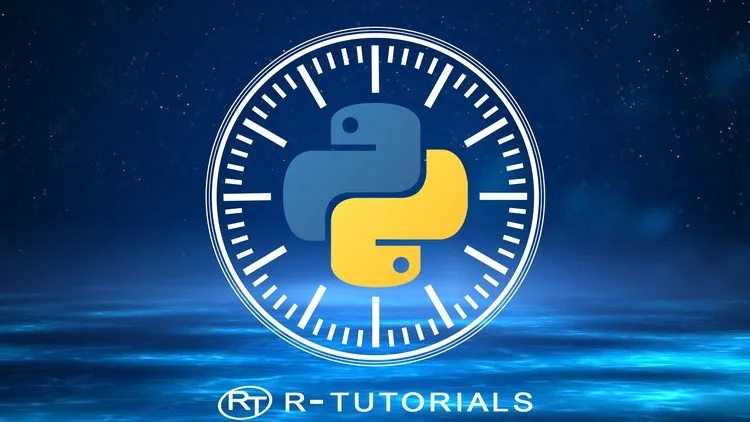Python for Time Series Analysis and Forecasting
Work with time series and time related data in Python - Forecasting, Time Series Analysis, Predictive Analytics

Python for Time Series Analysis and Forecasting udemy course
Work with time series and time related data in Python - Forecasting, Time Series Analysis, Predictive Analytics
What you'll learn:
-
ETS and Exponential Smoothing Models
-
Holt’s Linear Trend Model and Holt-Winters
-
Autoregressive and Moving Average Models (ARIMA)
-
Seasonal ARIMA (SARIMA), and SARIMAX
-
Auto ARIMA
-
The statsmodels Python library
-
The pmdarima Python library
-
Machine learning for time series forecasting
-
Deep learning (ANNs, CNNs, RNNs, and LSTMs) for time series forecasting
-
Tensorflow 2 for predicting stock prices and returns
-
Vector autoregression (VAR) and vector moving average (VMA) models (VARMA)
-
AWS Forecast (Amazon’s time series forecasting service)
-
FB Prophet (Facebook’s time series library)
-
Modeling and forecasting financial time series
-
GARCH (volatility modeling)
Requirements:
-
Decent Python coding skills
-
Numpy, Matplotlib, Pandas, and Scipy (I teach this for free! My gift to the community)
-
Matrix arithmetic
-
Probability
Description:
Use Python to Understand the Now and Predict the Future!
Time series analysis and forecasting is one of the key fields in statistical programming. It allows you to
see patterns in time series data
model this data
finally make forecasts based on those models
and of of this you can now do with the help of Python
Due to modern technology the amount of available data grows substantially from day to day. Successful companies know that. They also know that decisions based on data collected in the past, and modeled for the future, can make a huge difference. Proper understanding and training in time series analysis and forecasting will give you the power to understand and create those models. This can make you an invaluable asset for your company/institution and will boost your career!
What will you learn in this course and how is it structured?
First of all we will discuss the general idea behind time series analysis and forecasting. It is important to know when to use these tools and what they actually do.
After that you will learn about statistical methods used for time series. You will hear about autocorrelation, stationarity and unit root tests. You will also learn how to read a time series chart. This is a crucial skill because things like mean, variance, trend or seasonality are a determining factor for model selection.
We will also create our own time series charts including smoothers and trend lines.
Then you will see how different models work, how they are set up in Python and how you can use them for forecasting and predictive analytics. Models taught are: ARIMA, exponential smoothing, seasonal decomposition and simple models acting as benchmarks. Of course all of this is accompanied by homework assignments.
Where are those methods applied?
In nearly any field you will see those methods applied. Especially econometrics and finance love time series analysis. For example stock data has a time component which makes this sort of data a prime target for forecasting techniques. But of course also in academia, medicine, business or marketing techniques taught in this course are applied.
Is it hard to understand and learn those methods?
Unfortunately learning material on Time Series Analysis Programming in Python is quite technical and needs tons of prior knowledge to be understood.
With this course it is the goal to make modeling and forecasting as intuitive and simple as possible for you.
While you need some knowledge in maths and Python, the course is meant for people without a major in a quantitative field. Basically anybody dealing with time data on a regular basis can benefit from this course.
How do I prepare best to benefit from this course?
It depends on your prior knowledge. But as a rule of thumb you should know how to handle standard tasks in Python.
Who this course is for:
- data analysts working with time series data (which is essentially any data analyst at some point in the career)
- people using Python
- this course is for people working in various fields like (and not limited to): academia, marketing, business, econometrics, finance, medicine, engineering and science
- generally if you have time series data on your table and you do not know what to do with it and Python, take this course!
- Build A Landing Page With Conversion Rate Optimization 2022
- Object oriented programming with Javascript - Build Quiz App
- Let's Build a Go version of Laravel: Part Two
- Big Data and Hadoop for Absolute Beginners
Course Details:
- 5 hours on-demand video
- 2 articles
- 6 downloadable resources
- Full lifetime access
- Access on mobile and TV
- Certificate of completion
Python for Time Series Analysis and Forecasting udemy free download
Work with time series and time related data in Python - Forecasting, Time Series Analysis, Predictive Analytics
Demo Link: https://www.udemy.com/course/python-for-time-series-analysis-and-forecasting-arima/
